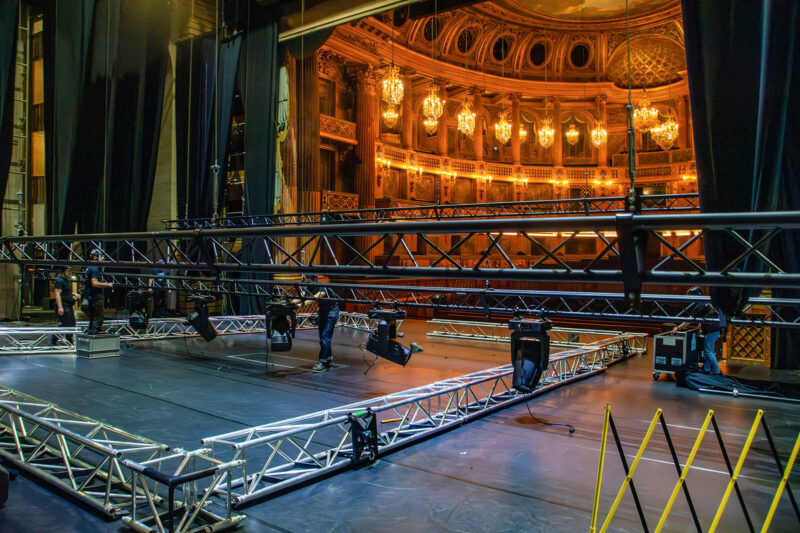
The Royal Opera of Versailles is part of the famous Palace of Versailles commissioned by King Louis XIV and has its own iconic place in French history. Inaugurated in 1770, it was designed by Ange-Jacques Gabriel and is also known as the Théâtre Gabriel. The interior decoration by Augustin Pajou is constructed almost entirely of wood – for enviable acoustics – and painted with a faux marble technique. After years of neglect, the venue was transformed by two complete more recent restorations – the 1200-capacity main room was re-gilded in 1957 and the stage and machinery were revamped in 2009. Since then, it has been busy hosting an annual program of concerts of baroque music, operas, and ballets.
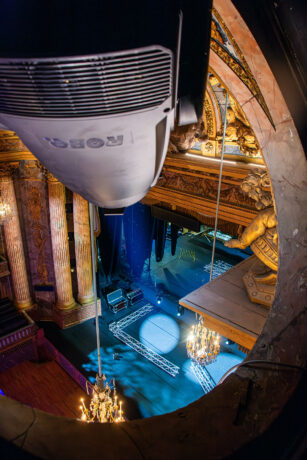 More recently, a major lighting upgrade comprising 40 Robe T2 Profiles was delivered in two batches by Robe France, an initial purchase of 30, followed by another 10 x T2 Profiles, which they liked so much that they purchased 12 x TX1 PosiProfiles. Hosting 30-40 shows a year, all with varying needs, Marc Blanc, technical director for Château de Versailles Spectacles, explained that the need for extra flexibility and moving lights had been steadily growing. Furthermore, they were being frequently requested by incoming productions, resulting in a substantial budget being spent on rentals.
More recently, a major lighting upgrade comprising 40 Robe T2 Profiles was delivered in two batches by Robe France, an initial purchase of 30, followed by another 10 x T2 Profiles, which they liked so much that they purchased 12 x TX1 PosiProfiles. Hosting 30-40 shows a year, all with varying needs, Marc Blanc, technical director for Château de Versailles Spectacles, explained that the need for extra flexibility and moving lights had been steadily growing. Furthermore, they were being frequently requested by incoming productions, resulting in a substantial budget being spent on rentals.
During Covid, Marc also had time to do some calculations and realized the time was right for a general lighting upgrade. He and his colleagues including chief electrician Thierry Giraud, console operator Guillaume Astier, and some of their regular lighting freelancers put their heads together and identified their main criteria for moving lights. They came up with – silence, optical quality, power, and availability – and looked at what other contemporary opera houses were using and specifying.
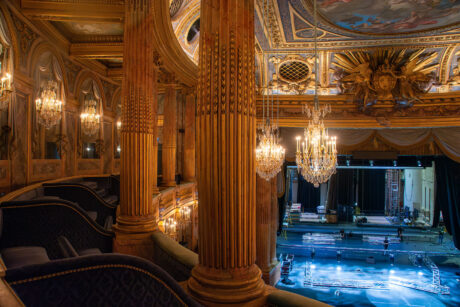 Additionally, Royal Opera of Versailles’ regular technical supplier, AudioScène, with whom they have worked for several years, was consulted and asked for their advice and opinions as well as if they could assist with arranging demonstrations with different brands. The options were narrowed down to two brands, one of which was Robe, and from that, the T2 Profile was selected.
Additionally, Royal Opera of Versailles’ regular technical supplier, AudioScène, with whom they have worked for several years, was consulted and asked for their advice and opinions as well as if they could assist with arranging demonstrations with different brands. The options were narrowed down to two brands, one of which was Robe, and from that, the T2 Profile was selected.
Robe Lighting France’s regional manager Franck Veber noted that the French office – and the brand generally – has been specified for several high profile opera houses, and for Versailles’ specific configuration, scenography and production schedule, he thought from the start that the T2 Profile would be a perfect fit. Robe products have also been specified, installed and are proving very successful in a number of opera houses around the world, with references at the Paris Opera, the Vienna State Opera, the Hungarian State Opera and The Baltic Opera in Poland to name a few, and this was another advantage when it came to making a decision.
In terms of the color rendering, they wanted to see on the sets, costumes and skin. the choice had to be a multispectral LED source, and Robe France’s Vincent Bouquet also answered all their technical questions in great detail which further impressed everyone. They were further impressed with the manufacturer’s guarantee and the fact that Robe products are entirely made in Europe, not just to be patriotic but also for practicality, as well as the brand’s superlative reputation for manufacturing robust and reliable products.
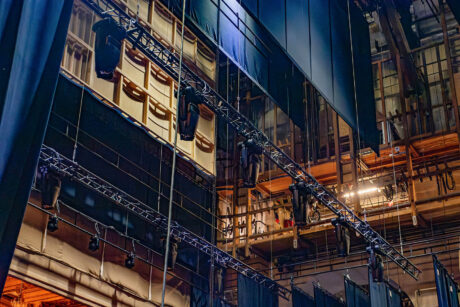 Nicolas Winkel, AudioScène’s general manager, commented that the multispectral LED source combines red, green, blue, white and lime green diodes to create a bright, crisp white which is superior to using subtractive color mixing methods which filter white light and reduce intensity.
Nicolas Winkel, AudioScène’s general manager, commented that the multispectral LED source combines red, green, blue, white and lime green diodes to create a bright, crisp white which is superior to using subtractive color mixing methods which filter white light and reduce intensity.
Robe’s highly innovative patented technology in this field adds the colors and preserves the luminous flux, so when it comes to mixing a specific color, the corresponding LEDs are illuminated without filters. “This methodology offers an increased precision ideal for the demanding requirements of theatre and opera, where quality of light is essential,” he observed. T2 Profiles also have an excellent CRI – color rendering index – which guarantees a richness and natural quality of light which “is exceptional” says Nicolas, highlighting that currently, Robe is the only manufacturer to offer this type of moving light. “Choosing the T2 Profile made it possible to renew the stock of equipment needed for above stage coverage,” stated Marc, adding that they have the benefits of “great support” from Robe Lighting France.
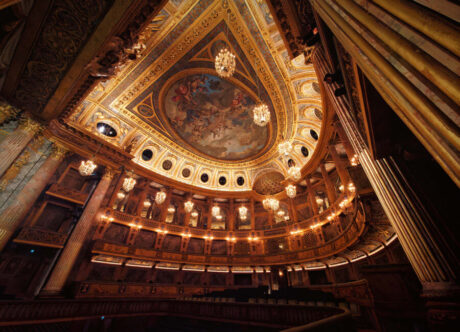 The 12 x TX1 PosiProfiles were purchased for rigging in the upper side parts of the auditorium, with no flying or attachment points they are positioned in the architectural bull’s-eyes, which present challenging angles and no room for fixtures to do their calibration ‘dance’. “The TX1 PosiProfile, is packed with remarkable ingenuity,” Marc declares referring to the fact it does not move during the calibration routine, making them ideal for this position. Joining them shortly will be 10 FORTE Fresnels for front and key lighting which will be delivered in the coming months.
The 12 x TX1 PosiProfiles were purchased for rigging in the upper side parts of the auditorium, with no flying or attachment points they are positioned in the architectural bull’s-eyes, which present challenging angles and no room for fixtures to do their calibration ‘dance’. “The TX1 PosiProfile, is packed with remarkable ingenuity,” Marc declares referring to the fact it does not move during the calibration routine, making them ideal for this position. Joining them shortly will be 10 FORTE Fresnels for front and key lighting which will be delivered in the coming months.
Nicolas explained that the FORTE was picked for its power – with fluxes of up to 50,000 lumens – and with the idea of eventually replacing all the older HMI sources, because they are energy intensive. When offered FORTE Fresnels as an equivalent, LDs and lighting directors are usually very happy as the luminaires have a consistent white temperature of 6,700K. “FORTES are more powerful than the HMIs they are replacing, they are still just as quiet, and have a beautiful quality of light,” concluded Marc, delighted that the additional rental budget for moving lights has currently been dramatically reduced.
Further information from Robe Lighting: www.robe.cz
Photos: By Maxime Jeanjean + Pascal Le Mée


